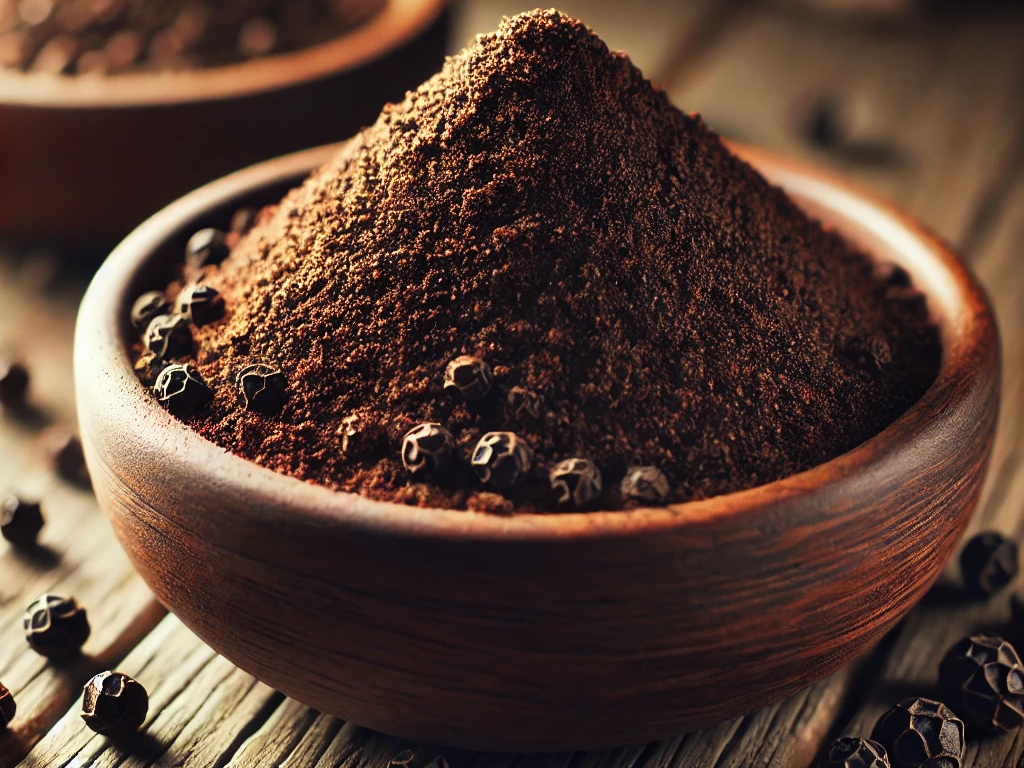Black pepper, often referred to as the “king of spices,” is a widely used seasoning that has been valued for centuries, both as a culinary staple and a traditional remedy. Derived from the dried berries of the Piper nigrum plant, black pepper adds a bold, spicy flavor to dishes while offering a host of health benefits. Rich in piperine, a bioactive compound, black pepper enhances digestion, boosts nutrient absorption, and exhibits powerful antioxidant and anti-inflammatory properties. In this article, we’ll explore the health advantages and versatile uses of black pepper.
Health Benefits of Black Pepper
Rich in Antioxidants: Black pepper is packed with antioxidants that help fight free radicals, reducing oxidative stress and protecting cells from damage that can lead to chronic diseases.
Improves Digestion: Black pepper stimulates the production of digestive enzymes, improving digestion and nutrient absorption. It also helps reduce bloating and indigestion
Boosts Nutrient Absorption: Piperine in black pepper enhances the absorption of nutrients like curcumin (from turmeric), vitamins, and minerals, making it a powerful companion to other health-boosting foods.
Supports Weight Management: Black pepper may help increase metabolism and support fat breakdown, making it a useful addition to a weight management plan.
Enhances Brain Health: Piperine has been studied for its potential neuroprotective effects. It may improve memory, cognitive function, and protect against neurodegenerative conditions like Alzheimer’s disease.
Fights Inflammation: Black pepper has anti-inflammatory properties that may help reduce inflammation and manage conditions like arthritis and other inflammatory disorders.
Boosts Immune Health: Black pepper contains antimicrobial properties that help the body fight infections. Its antioxidants also support a strong immune system.
Promotes Respiratory Health: Black pepper is a natural expectorant, helping to clear congestion and improve respiratory issues like colds, coughs, and sinusitis.
May Help Regulate Blood Sugar: Studies suggest that black pepper may improve insulin sensitivity and help regulate blood sugar levels, which is beneficial for people with diabetes.
Supports Skin Health: Black pepper’s antioxidant and antibacterial properties can help protect the skin from damage, reduce acne, and promote a healthy complexion.
Uses of Black Pepper
Flavoring Agent: Black pepper is used to enhance the flavor of a wide variety of dishes, including meats, vegetables, soups, and sauces. It can be used whole, cracked, or ground.
Preservative: Due to its antimicrobial properties, black pepper has been used historically as a preservative for food.
Digestive Health: Black pepper is believed to stimulate the production of digestive enzymes, which may aid in digestion.
Aromatherapy: Black pepper essential oil is used in aromatherapy for its potential warming and stimulating effects.
Traditional Medicine: In traditional medicine, black pepper has been used for various ailments, including respiratory issues, digestive problems, and as a natural remedy for colds.
Safety Considerations
Allergic Reactions: Some individuals may be allergic to black pepper. Symptoms can include itching, swelling, or difficulty breathing. If you experience these symptoms, seek medical attention.
Pregnancy and Breastfeeding: While culinary amounts of black pepper are generally considered safe, high doses or concentrated forms (like essential oil) should be avoided during pregnancy and breastfeeding due to potential effects on the digestive system.
Drug Interactions: Black pepper may interact with certain medications, including blood thinners and medications that affect blood sugar levels. Consult a healthcare provider if you are on medication and considering black pepper supplements.
Essential Oil Safety: Black pepper essential oil is potent and should be used with caution. It should be diluted before topical application and should not be ingested in large amounts without professional guidance.
Dosage: If using black pepper supplements or essential oil, follow the recommended dosages on the product label or consult a healthcare professional for guidance.
Conclusion
Black pepper is more than just a flavor enhancer, it’s a spice with significant health-promoting properties. Its active compound, piperine, supports digestion, improves nutrient absorption, and combats oxidative stress. By incorporating this versatile spice into your diet, you can enjoy its robust flavor and numerous health benefits.
